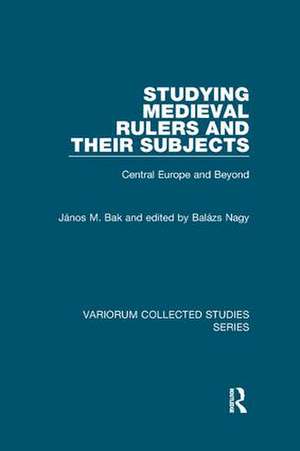Studying Medieval Rulers and Their Subjects: Central Europe and Beyond: Variorum Collected Studies
Autor János M. Bak, edited by Balázs Nagyen Limba Engleză Paperback – 10 iun 2019
Din seria Variorum Collected Studies
-
 Preț: 311.18 lei
Preț: 311.18 lei -
 Preț: 310.55 lei
Preț: 310.55 lei -
 Preț: 299.55 lei
Preț: 299.55 lei - 9%
 Preț: 1041.23 lei
Preț: 1041.23 lei -
 Preț: 386.77 lei
Preț: 386.77 lei -
 Preț: 351.48 lei
Preț: 351.48 lei -
 Preț: 313.38 lei
Preț: 313.38 lei -
 Preț: 386.77 lei
Preț: 386.77 lei -
 Preț: 310.22 lei
Preț: 310.22 lei -
 Preț: 258.66 lei
Preț: 258.66 lei -
 Preț: 343.33 lei
Preț: 343.33 lei - 9%
 Preț: 938.44 lei
Preț: 938.44 lei -
 Preț: 311.41 lei
Preț: 311.41 lei - 9%
 Preț: 938.85 lei
Preț: 938.85 lei -
 Preț: 312.75 lei
Preț: 312.75 lei - 9%
 Preț: 936.60 lei
Preț: 936.60 lei -
 Preț: 341.55 lei
Preț: 341.55 lei -
 Preț: 320.00 lei
Preț: 320.00 lei - 34%
 Preț: 764.20 lei
Preț: 764.20 lei - 22%
 Preț: 312.43 lei
Preț: 312.43 lei - 34%
 Preț: 739.65 lei
Preț: 739.65 lei - 34%
 Preț: 764.20 lei
Preț: 764.20 lei - 34%
 Preț: 680.73 lei
Preț: 680.73 lei - 26%
 Preț: 247.40 lei
Preț: 247.40 lei - 34%
 Preț: 485.78 lei
Preț: 485.78 lei - 34%
 Preț: 764.20 lei
Preț: 764.20 lei - 34%
 Preț: 769.51 lei
Preț: 769.51 lei - 34%
 Preț: 764.20 lei
Preț: 764.20 lei - 34%
 Preț: 826.68 lei
Preț: 826.68 lei - 25%
 Preț: 222.32 lei
Preț: 222.32 lei - 25%
 Preț: 225.54 lei
Preț: 225.54 lei - 34%
 Preț: 767.07 lei
Preț: 767.07 lei - 34%
 Preț: 764.20 lei
Preț: 764.20 lei - 34%
 Preț: 736.38 lei
Preț: 736.38 lei - 34%
 Preț: 738.42 lei
Preț: 738.42 lei - 25%
 Preț: 226.52 lei
Preț: 226.52 lei - 33%
 Preț: 491.66 lei
Preț: 491.66 lei - 34%
 Preț: 485.78 lei
Preț: 485.78 lei - 34%
 Preț: 485.78 lei
Preț: 485.78 lei - 34%
 Preț: 764.20 lei
Preț: 764.20 lei - 34%
 Preț: 736.38 lei
Preț: 736.38 lei - 31%
 Preț: 473.94 lei
Preț: 473.94 lei - 18%
 Preț: 807.71 lei
Preț: 807.71 lei - 34%
 Preț: 764.20 lei
Preț: 764.20 lei - 34%
 Preț: 764.20 lei
Preț: 764.20 lei - 34%
 Preț: 764.20 lei
Preț: 764.20 lei - 51%
 Preț: 485.78 lei
Preț: 485.78 lei - 34%
 Preț: 485.78 lei
Preț: 485.78 lei - 34%
 Preț: 769.10 lei
Preț: 769.10 lei - 34%
 Preț: 766.65 lei
Preț: 766.65 lei
Preț: 302.55 lei
Preț vechi: 343.09 lei
-12% Nou
Puncte Express: 454
Preț estimativ în valută:
57.90€ • 59.82$ • 48.16£
57.90€ • 59.82$ • 48.16£
Carte tipărită la comandă
Livrare economică 19 martie-02 aprilie
Preluare comenzi: 021 569.72.76
Specificații
ISBN-13: 9781138375826
ISBN-10: 1138375829
Pagini: 324
Dimensiuni: 150 x 224 mm
Greutate: 0.6 kg
Ediția:1
Editura: Taylor & Francis
Colecția Routledge
Seria Variorum Collected Studies
Locul publicării:Oxford, United Kingdom
ISBN-10: 1138375829
Pagini: 324
Dimensiuni: 150 x 224 mm
Greutate: 0.6 kg
Ediția:1
Editura: Taylor & Francis
Colecția Routledge
Seria Variorum Collected Studies
Locul publicării:Oxford, United Kingdom
Cuprins
Contents: Preface; Part I The Study of Rulers and Ruled: Medieval symbology of the state: Percy E. Schramm's contribution; Percy Ernst Schramm (1895-1970) on P.E. Schramm; Coronation studies: past, present, and future - 30 years later; Serfs and serfdom: words and things; Probleme einer vergleichenden Betrachtung mittelalterlicher Eliten in Ostmitteleuropa. Part II Central European Rulers: Symbols and Functions: Holy lance, holy crown, holy dexter: sanctity of insignia in medieval East Central Europe; Sankt Stefans Armreliquie im Ornat König Wenzels von Ungarn; Legitimization of rulership in 3 narratives from 12th-century Central Europe; Lists in the service of legitimation in Central European sources; Queens as scapegoats in medieval Hungary. Part III Hungary in the Late Middle Ages: A kingdom of many languages: the case of medieval Hungary;Monarchie im Wellental: Materielle Grundlagen des ungarischen Königtums im fünfzehnten Jahrhundert; Sigismund and the Ottoman advance; Hungary and crusading in the 15th century; 'Good king Polish Ladislas ...': history and memory of the short reign of Wladislaw Warnenczyk in Hungary; The Hungary of Matthias Corvinus: a state in 'Central Europe' on the threshold of modernity. Part IV History and Politics: The ideology of a 'millennial constitution' in Hungary (written with Anna Bak-Gara); Die Mediävisierung der Politik im Ungarn des 19. und 20. Jahrhunderts; Publications of János M. Bak, 1999-2009; Index.
Notă biografică
János M. Bak is Emeritus Professor of History at the University of British Columbia, Canada, and at the Central European University, Hungary. Edited by Balázs Nagy and Gábor Klaniczay.
Recenzii
'The uses of authority-symbols and inauguration rituals for forging national identity in a loose-knit and heterogeneous polity receive brilliant elucidation from these investigations of a scholar steeped in medieval western and Byzantine history alongside his native Hungary’s past and present. The editors deserve praise not just for setting scattered articles between hard covers but for creating a coherent whole.' English Historical Review
Descriere
This selection of articles, published for the 50th anniversary of the author's doctorate at Göttingen, opens with studies on his teacher, Percy Ernst Schramm, and his contribution to the study of the medieval state and continues with examples of state symbology from Central Europe. Questions of legitimization and representation of kings and queens through texts and Herrschaftszeichen as well as the development of "coronation studies" are addressed in a comparative framework. The second part contains articles on social and political history mainly of the kingdom of Hungary in the fifteenth century, also attempting to place the issues into a wider context. Finally, two pieces present and discuss the "use" or "abuse" of the Middle Ages in the political discourse and display of our times.
